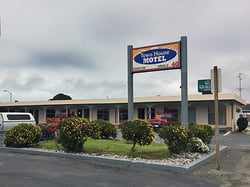Recent reports say that approximately 25% of hotels cannot pay their mortgages and are at risk of
foreclosure. One example is the famed Roosevelt Hotel, which survived a world war and the Great
Depression during its nearly 100-year history in Midtown Manhattan, but the COVID-19 pandemic has
been too much for it to weather.
While it is one of the most high-profile closures so far, it certainly will not be the last. Approximately
$20.6 billion in hotel mortgage loans were delinquent as of July – the owner of the famed Palmer House
hotel in Chicago for $338 million in missed payments.
 Few industries have been hit as hard by the COVID-19 pandemic as the hospitality industry. While many
Few industries have been hit as hard by the COVID-19 pandemic as the hospitality industry. While many
restaurants have been able to operate using takeout and delivery, even in the most restrictive states,
hotels have not been as fortunate. Some hotels repurposed themselves to maintain operations by acting
as: quarantine sites for travelers or hospital patients, housing for first-responders and unhoused
individuals, and auxiliary dormitories for universities to reduce the density of their on-campus housing.
Other hotels have stayed afloat with money from the Federal stimulus legislation. But with no economic
relief – whether through legislation or an effective vaccine and a return to more normal operations – in
sight, experts warn of a “tsunami” of hotel closures.
Receivers are an option for lenders if they want to take over and stabilize hospitality properties.
Contrary to the belief that receivership can be prohibitively expensive, receivers can be a cost-effective
way for lenders to manage the potential influx of troubled properties.
Taking back and running properties – particularly those that were previously closed – will lead to high
added costs for lenders, particularly if they do not have the required expertise to run a hotel. Receivers,
on the other hand, handle such operations daily and specialize in managing troubled assets.
They know how to quickly take over properties, manage expenses. and maintain the value of an asset
while also understanding the unique aspects of the hospitality industry, such as franchisor requirements.
The stability that a receiver can bring to a property may also provide the lender with a better return in
an eventual sale.
Griswold Law has a wealth of experience in taking over and operating troubled businesses.
The experts at Griswold Law, APC have been appointed as a receiver over 100 times by courts
across California to take control of disputed and/or distressed real property and businesses.
For more information, contact Griswold Law, APC at (858) 481-1300.

